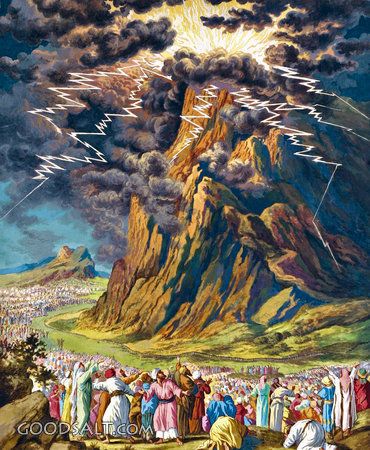In Matthew 22:34-40, one of the Pharisees, an expert in the law, tested Jesus by asking Him what the greatest commandment was in all the Law. Jesus responded by quoting Deut. 6:5 which says, “Love the Lord your God with all your heart and with all your soul and with all your mind.” Jesus then added Leviticus 19:18, “Love your neighbor as yourself” as the second greatest commandment stating that these two commandments form the foundation for all the Law and the Prophets.
Jesus did not randomly select these verses. The passage in Deuteronomy 6:4-5 is one that every Jew would have memorized from early childhood. It is called the Shema and is an important prayer Jewish people would have prayed every morning and every evening: and still do. The prayer begins with “Hear, O Israel: The LORD our God, the LORD is one.” (Deut. 6:4). The first word Hear is the Hebrew word Shema from which the prayer gets its name. However, Shema means more than taking in sound through our ears. It includes the idea of acting upon what is heard. Therefore, God was not just telling Israel to listen and pay attention. He was telling them to act upon what they hear and obey His words. He was telling them to be doers of His word and not hearers only (James 1:22).
This is also true of many Hebrew verbs: they are not merely mental activities but encompass action as well. For example, when the Bible tells us to believe or have faith in God, it means more than mentally acknowledging certain facts or information about God. It includes believing in God enough that we are willing to put our faith into action and obey what He tells us to do as when Noah built the ark at God’s command because he believed Him.
The word love is another example. We often think of love as an emotion: having good feelings towards someone. But, although love can involve our emotions, it is better to see it as an act of kindness. We love someone when we do loving things for them. Therefore, when God commands us to love our enemies, He is not telling us to develop an emotional attraction for them. Instead, He is telling us to do acts of love for them even if we don’t feel loving towards them. We’ll discuss this more later.
The next key word in the prayer is the word Echad which is often used to mean “one” in the sense of singular. Therefore, the common translation of the phrase is, “The LORD our God, the LORD is one” meaning that there is only one God as compared to the many gods of the other cultures. This would, then, be a statement of belief: that we believe in only one God and He is Jehovah. However, another way the word Echad can be translated is “alone” which would change the phrase to “The LORD is our God, the LORD alone.” Lois Tverberg, in her book, Walking in the Dust of Rabbi Jesus, states that this translation is becoming widely used and that scholars believe that this is more likely the original sense of the word Echad. If this is true, then this would change the purpose of the Shema. Instead of being a command to adhere to a particular belief about monotheism, it is calling the person to pledge allegiance to God. It is a twice-daily recommitment to worship and serve God and God alone.
Following the command to hear God’s word and obey it, and to recommit ourselves to worship and serve God alone, we are commanded to love God. Remember, the word love in Hebrew involves more than emotion. After all, how can you command someone to love someone else? You can’t. Therefore, the command is not to develop loving feelings towards God but to demonstrate our love to God through the way we live. Let’s look at how this works.
First, God is commanding us to love Him with all our heart. We usually think of the heart as the seat of our emotions, which is why we view love as an emotional feeling. But in Hebrew, the word for heart (levav) also includes one’s mind and thoughts. This is why God says in verse six, “These commandments that I give you today are to be on your hearts”. This also fits with verse eight where God says, “Tie them (His commands) as reminders on your hands and bind them on your foreheads.” In other words, all our thoughts and all our actions are centered on the Word of God. Therefore, we demonstrate our love for God by constantly meditating on His word and using it to guide our actions by “bringing every thought into captivity to the obedience of Christ”. (2 Cor. 10:5)
Next, we are to love God with all our soul. The word for soul is Nephesh which means life or being, the part of us that exists while we have breath. Tverberg states that “the Jewish interpretation of this line is that you are to love the Lord with all of your life, meaning with every moment throughout your life” (2012, 48). Therefore, we demonstrate our love for God by giving Him every moment of our life as long as we have breath, and not just a few moments a week or when it is convenient.
Finally, we are commanded to love God with all our strength. The word used here is Meod, and has nothing to do with power, might, or strength. The word means muchness, abundance, or very. According to the Brown-Driver-Briggs Hebrew Lexicon, it expresses the idea of magnitude or degree. It is a common adverb used to intensify adjectives such as when someone says they are very well. It is the word used in Gen. 1:31 when God says that His creation is “very good”.
So, how does this apply to loving God? Randall Buth, a Hebrew scholar, reads this phrase as saying that we are to love God with all our oomph (Tverberg 2012, 51)! In other words, we demonstrate our love for God by loving Him heartily, earnestly, with much zeal, with every fiber of our being, and with everything we’ve got! Maybe as David did when he brought the ark into Jerusalem and he “danced with all his might before the LORD” (2 Sam. 6:14).
In summary, when God commands us to love Him, He is not commanding us to have warm, fuzzy feelings towards Him. He is commanding us to demonstrate our love to Him by hearing His words and obeying them, by committing our lives to Him and Him alone, by bringing all our thoughts and actions into submission to His word, by worshipping and serving Him as long as we have breath, and by serving Him heartily and zealously. In other words, if we love Him, we will obey His commandments (John 14:15).
Based on the Shema in Deut. 6:4-5, I’ve put together my version of the prayer. LORD, I hear Your words and I will obey them. I recognize that You are the LORD, and I commit myself to You alone. I will demonstrate my love to You by submitting my thoughts, my will, and my actions to Your will. I will love You by dedicating every part of my life to You as long as I have breath. And I will love you heartily: with all my “oomph!”
Tverberg, Lois. 2012. Walking in the Dust of Rabbi Jesus: How the Jewish Words of Jesus Can Change Your Life. Zondervan. Kindle Edition.





